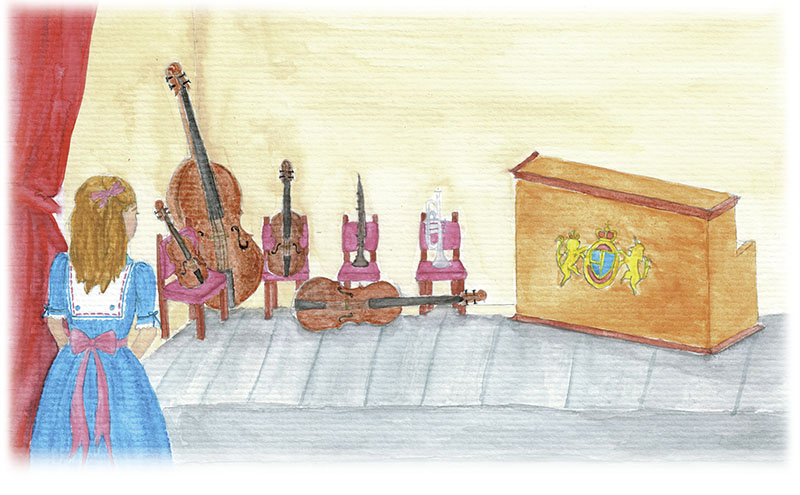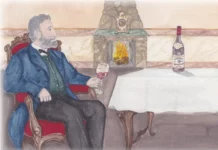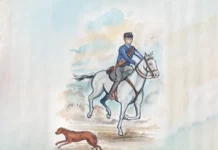As I admired the beauty of the London Opera, a heated discussion caught my attention. Who was to blame, after all? Better still, who could provide the solution?
Once, while strolling through the streets of London, I found myself before the famous Royal Opera House. Delighted, I stopped to contemplate its Grecian façade displaying six Corinthian columns, at once towering, robust and austere.
I felt irresistibly drawn to enter the splendid building. Inside, I became enchanted with the balconies covered with elaborate gold ornamentation from the Baroque era, and I lingered there a while to take in all of its detail.
But as I feasted my eyes on the beauty of this architectural masterpiece, I began to hear whispers coming from the stage area. “How strange!” I thought, for the theatre had appeared to be empty.
Intrigued, I followed my ears, trying to discover the source of those sounds. I soon realized, to my astonishment, that the whispers were not coming from people like me, but from the musical instruments set up on the stage!
Paying close attention, I was able to make out what they were saying. A curious quarrel was taking place.
“It’s all the organ’s fault!” said several instruments in unison. “She always steals the notes of the others! She’s a thief!”
The accused instrument sighed majestically and replied:
“No, my friends! Don’t you realize that the trumpet is the one to blame? He is an arrogant fellow, continually drawing attention to himself!”
Taking offence at that remark, the brass instrument retorted indignantly:
“I say, Mrs. Organ! It’s very easy to throw all the blame on the trumpet, when clearly the oboe is responsible! Competitive as he his, he divides us all with his arguing!”
Hearing this, the oboe’s temper flared and he cried out in an authoritative tone:
“You are sorely mistaken, Mr. Trumpet! You ought to accuse the violin. Whatever she decides, we must obey: If she plays high notes, everyone must do the same, if she descends to the low notes we are obliged to come down with her. Why? To satisfy her every whim! It is unjust!”

After a sidelong glance at the oboe, and a momentary pause for suspense, the violin replied dryly:
“Allow me to ignore to the words of Mr. Oboe, who only speaks out of sheer jealousy. In reality, it is the viola who is at the root of the problem. She is forever insecure, only playing as accompaniment or with accompaniment, leaving others to carry the melody as soloists! That is what I call irresponsible! How many agree with me?”
By now the viola was feeling very insecure indeed, and thought to herself, “How can I prove them wrong? It’s true that I only play along with others… I’ll have to turn the accusation to the bass section!” And with the smug tone of someone who has defects to hide, she answered:
“No, no, no! Look at the cello and double bass, ladies and gentlemen. They are so serious that they make the orchestra sound sombre and dreary… It should not be that way! Our music must by joyous and lively!”
The cello and bass fiddle exchanged looks. The latter, being older, took the floor and replied with in his ponderous tone:
“Sorry to contradict you, madam viola, but your accusation is not in accord with the laws of harmony. We need to be balanced! Imagine! If we were to stop playing, the music would be shallow and lacking in volume. We are indispensable to the ensemble! I regret to say it, but if there is one instrument we could do without, it’s you!”
Overeager to justify herself, the viola began to sputter:
“You think I am imbalanced? Far from it! I am neither shrill like the violin, who can lend an excessively superficial tone to the piece, nor overly deep like the basses who tend to make the music too solemn. I represent perfect balance within the orchestra!”
Two hours of debate had passed, yet the instruments showed no sign of tiring. I was turning to leave in exasperation, when I suddenly saw the great George Frideric Handel entering by the main door. He wore a dark red coat and a white wig, and a silk cravat hung decorously from his neck.
When the instruments saw the maestro approaching, there was a veritable clamour: they all wanted their own opinion to be heard. Handel called for order with a few loud claps, and bellowed:

“Enough quarrelling! Let us begin! To your stations, all of you!”
Quick as lightning, all the instruments took their proper places: the organ took the centre stage; the trumpet went further back, with the intention of being humbler; the oboe went and stood beside him, now no longer in a spirit of competition and dispute. They were followed by the basses, who took their position nearby with a discreet smile; the viola went resolutely to her post and, finally, the violin positioned herself solemnly at maestro Handel’s left side, assuming the role of first violinist.
At a wave of the composer’s baton, they together sounded the glorious overture strains of his most famous oratorio, Messiah.
Amazed, I listened to them perform the piece, and went to speak to Handel when it was over.
“Mr. Handel, how did you manage to put an end to…”
Just then, I was interrupted by the sound of an alarm clock, and I awoke with a start. It had all been a dream…
Nevertheless, the scene I witnessed reminds me of certain realities that human beings face on a daily basis. When we look at ourselves individually, we see defects that truly exist and hinder our way to Heaven. However, if we keep our eyes on the score and, above all, on the Divine Conductor, He will help us to overcome our defects and play together in perfect harmony! ◊







